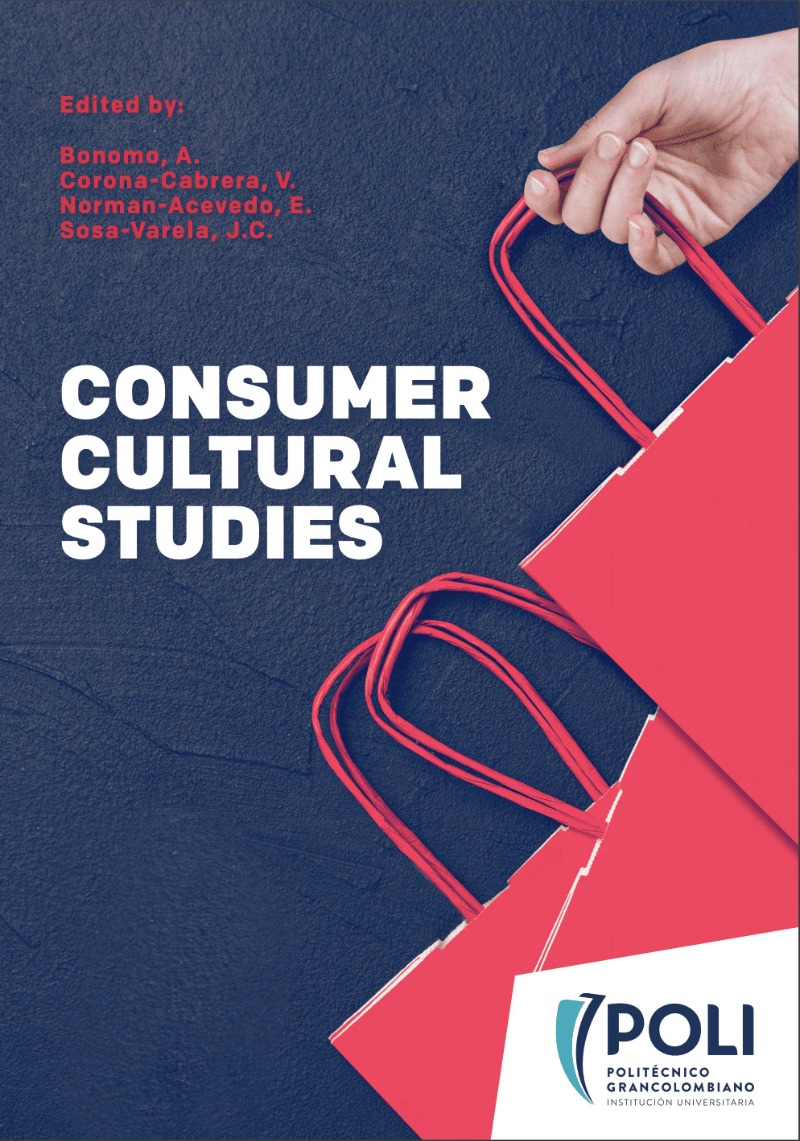Resumen
Marketing -as a social discipline that outlines cultural traits- involves a series of new social players in constant change who affix new concepts to the construction of the culture of consumption, its evolution and behavior.
Understanding this and reaching an improved and complete holistic vision of the factors that affect consumers’ purchase decisions (Rehman, 2017) and their influence on marketing as a social phenomenon results in a field that has been and must be explored from the outskirts in scientific papers, such as the structured review “Consumer culture theory: Development, critique, application and prospects” by Arnould, Press, Salminen, & Tillotson (2019) who validate the need to research and disseminate findings in this area of knowledge in a book that provides a rigorous literature update due to the fact that it proposes interesting journeys through different approaches in order to understand consumption culture’s studies.
Referencias
Ammar, O., Garbout, S., & Trigui, I. T. (2018). Co-design and chronic regulatory focus: A cross-cultural study and suggestions for future e-marketing practices (B. T. M.A., J. R., K. Y., & N. A., Eds.). 3rd International Conference on Digital Economy, ICDEc 2018, Vol. 325, pp. 28–47. https://doi.org/10.1007/978-3-319-97749-2_3
Arnould, E., Press, M., Salminen, E., & Tillotson, J. S. (2019). Consumer culture theory: Development, critique, application and prospects. Foundations and Trends in Accounting, 12(2), 80–166. https://doi.org/10.1561/1700000052
Brenes, M. D. C. R., & Hernández Rivero, V. M. (2018). The incorporation and use of ICT in early childhood education. A study on infrastructure, teaching methods and teacher training in Andalusia . Pixel-Bit, Revista de Medios y Educacion, (52), 81–96. https://doi.org/10.12795/pixelbit.2018.i52.06
Chekima, B., Chekima, S., Syed Khalid Wafa, S. A. W., Igaua, O. A., & Sondoh, S. L. (2016). Sustainable consumption: The effects of knowledge, cultural values, environmental advertising, and demographics. International Journal of Sustainable Development and World Ecology, 23(2), 210–220. https://doi.org/10.1080/13504509.2015.1114043
Elghannam, A., Arroyo, J., Eldesouky, A., & Mesias, F. J. (2018). A cross-cultural consumers’ perspective on social media-based short food supply chains. British Food Journal, 120(10), 2210–2221. https://doi.org/10.1108/BFJ-11-2017-0633
Faletar, I., Kovačić, D., & Cerjak, M. (2018). Buying behaviour of organic vegetables consumers in Croatia. Agriculturae Conspectus Scientificus, 83(3), 213–218. Retrieved from https://www.scopus.com/inward/record.uri?eid=2-s2.0-85056350919&partnerID=40&md5=588cdf-2659b4ebcfab3f01382f5fa948
Fernández-Hernández, C., León, C. J., Aranã, J. E., & Díaz-Pére, F. (2016). Market segmentation, activities and environmental behaviour in rural tourism. Tourism Economics, 22(5), 1033–1054. https://doi.org/10.5367/te.2015.0476
Ganglmair-Wooliscroft, A., & Wooliscroft, B. (2019). Well-Being and Everyday Ethical Consumption. Journal of Happiness Studies, 20(1), 141–163. https://doi.org/10.1007/s10902-017-9944-0
Guo, C., Kulviwat, S., Zhu, J., & Wang, Y. J. (2019). Competing in an emerging market: antecedents and consequences of market orientation and the role of environmental factors. Journal of Strategic Marketing, 27(3), 248–267. https://doi.org/10.1080/0965254X.2017.1411386
Jeong, N., Yoo, Y., & Heo, T.-Y. (2011). Market segmentation strategies for future telecommunications services. Portland International Center for Management of Engineering and Technology- Technology Management in the Energy-Smart World, PICMET’11. Retrieved fromhttps://www.scopus.com/inward/record.uri?eid=2-s2.0-80053380188&partnerID=40&md5=54b1350714afd377159c0838039d4aa6
Kimixay, L., Cheng, L., & Liu, X. (2019). An empirical study to understand the effect of email marketing on Consumer’s online buying behavior in a developing country. 3rd International Conference on Management Engineering, Software Engineering and Service Sciences, ICMSS 2019, 179–183. https://doi.org/10.1145/3312662.3312669
Li, M., Zhang, H., Xiao, H., & Chen, Y. (2015). A grid-group analysis of tourism motivation. International Journal of Tourism Research, 17(1), 35–44. https://doi.org/10.1002/jtr.1963
Moraes, C., Carrigan, M., Bosangit, C., Ferreira, C., & McGrath, M. (2017). Understanding Ethical Luxury Consumption Through Practice Theories: A Study of Fine Jewellery Purchases. Journal of Business Ethics, 145(3), 525–543. https://doi.org/10.1007/s10551-015-2893-9
Papaoikonomou, E., & Alarcón, A. (2017). Revisiting Consumer Empowerment: An Exploration of Ethical Consumption Communities. Journal of Macromarketing, 37(1), 40–56. https://doi.org/10.1177/0276146715619653
Rehman, V. (2017). Looking through the Glass of Indian Culture: Consumer Behaviour in Modern and Postmodern Era. Global Business Review, 18(3_suppl), S19–S37. https://doi.org/10.1177/0972150917693139
Simpson, K., Bretherton, P., & Vere, G. D. (2012). Lifestyle market segmentation, small business entrepreneurs, and the New Zealand wine tourism industry. In Hospitality, Tourism, and Lifestyle Concepts: Implications for Quality Management and Customer Satisfaction (pp. 157–188). https://doi.org/10.1300/J162v05n02_09
Sirtautiene, D., & Sirtautas, V. V. (2009). Consumer market segmentation on the base of evaluating TV commercials. Transformations in Business and Economics, 8(2), 150–168. Retrieved from https://www.scopus.com/inward/record.uri?eid=2-s2.0-67650270035&partnerID=40&md5=bba05abcf772cbbbdd7239e8e0371c81
Steenkamp, J.-B. E. M., & Ter Hofstede, F. (2002). International market segmentation: Issues and perspective. International Journal of Research in Marketing, 19(3), 185–213. https://doi.org/10.1016/S0167-8116(02)00076-9
Swain, A. K., & Dhurkari, R. K. (2018). Shopping goods and consumer buying behavior: An AHP perspective. 2018 International Conference on Computers in Management and Business, ICCMB 2018, 9–13. https://doi.org/10.1145/3232174.3232179
Zaharia, S. (2019). Online Shopping Motives - An Empirical Investigation of Consumer Buying Behavior in Germany’s Main Online Retail Segments (N. F.F.-H. & S. K., Eds.). 6th International Conference on HCI in Business, Government, and Organizations, HCIBGO 2019, Held as Part of the 21st International Conference on Human-Computer Interaction, HCI International 2019, pp. 333–349. https://doi.org/10.1007/978-3-030-22335-9_23
Zollo, L., Yoon, S., Rialti, R., & Ciappei, C. (2018). Ethical consumption and consumers’ decisión making: the role of moral intuition. Management Decision, 56(3), 692–710. https://doi.org/10.1108/MD-10-2016-0

Esta obra está bajo una licencia internacional Creative Commons Atribución-SinDerivadas 4.0.
Derechos de autor 2020 Institución Universitaria Politécnico Grancolombiano





